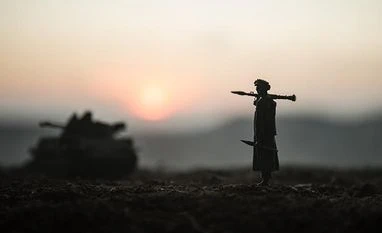India on Thursday urged the international community to "call out those" who provide safe havens to terrorists and come to their defence including in the UN Security Council sanctions regimes, a veiled reference to Pakistan and China.
Foreign Secretary Vinay Kwatra made the remarks while speaking at the open debate held under Ghana's Presidency of the 15-nation Council on Peacebuilding and sustaining peace: Integrating effective resilience-building in peace operations for sustainable peace.'
"The threat posed by terrorism needs a unified voice from the international community. We should strengthen capabilities of the host state security forces, join hands in preventing the terrorist forces from gaining access to financial resources and must collectively call out those who provide safe havens to terrorists as also those who stand with them and come to their defense including in the UNSC sanctions regimes, he said.
His remark appeared to be a veiled reference to Pakistan and China.
In the past five months, China, a permanent, veto-wielding member of the UN Security Council, has put holds on as many listing proposals by India and the US to designate Pakistan-based terrorists under the Council's 1267 Al Qaeda Sanctions Committee regime.
Since June, China, Islamabad's all-weather ally, has put holds on proposals to blacklist Pakistan-based terrorist Hafiz Talah Saeed, Lashkar-e-Taiba terrorists Shahid Mahmood and Sajid Mir, senior Jaish-e-Mohammed leader Abdul Rauf Azhar and Abdul Rehman Makki under the Al Qaeda Sanctions regime.
India and the US had submitted proposals to designate the Pakistan-based terrorists and subject them to asset freeze, travel ban and arms embargo but hit stumbling blocks when Beijing placed holds on the proposals.
In his remarks, Kwatra said that UN peacekeeping operations commenced seven decades ago as relatively simple, largely unidimensional missions, designed to keep the peace and to facilitate political processes aimed at finding lasting solutions to conflicts.
Also Read
"This context has changed profoundly over the years. Today, both political and security environment as also the nature of conflict have undergone paradigm shifts. It has become more complex, uncertain, volatile and ambiguous. Conflicts are far more fragmented with the participation of non-state actors, including armed militias, terrorist and organised criminal groups, in many instances with political support, he said.
He said technological advances have also contributed to the changing nature of such conflict in many ways. "Terrorist and radical extremist groups have unprecedented access to various technological tools to incite, do propaganda, and undertake recruitment, as well as for the purchase of weapons and funding of illegal money transfers, he said.
Noting that the conflict scenarios are often characterised by breakdown in the rule of law, absence of effective state institutions, proliferation of illicit economic activities and illegal exploitation of natural resources, he said these factors are also manipulated by terrorist and radical groups to serve their nefarious objectives.
Kwatra stressed that the need of the hour is a holistic approach, coordinated action and a clear strategy that addresses the challenges to peacekeeping operations and peacebuilding.
He noted that in contemporary conflicts, solutions often lie in the political and social domains, not just the security. "As such, peace operations can create conditions for political and social processes to take hold, but not replace them," he said.
India pointed out that peacekeeping and peacebuilding are mutually exclusive and attempts to extend the role of peacekeeping missions to peacebuilding tasks would strengthen neither. Indeed weaken both."
Further, he said that the military component of peacekeeping can only play an enabling role but cannot on its own bring about peacebuilding.
"Realistic assessment in this regard is the need of the hour, he said.
Kwatra added that when it pertains to Africa, it is important that solutions anchored in African regional organisations are given a priority and as a good road ahead for resolution of many contemporary armed conflicts.
"India recognises the primacy of national governments and authorities in identifying and driving priorities, strategies and activities for sustaining peace. What is needed is to work closely with member states, in line with their national requirements and needs rather than advocate prescriptions and solutions from outside," he said.
He noted that as the world's largest democracy, India is convinced that representative and inclusive governance structures will help stabilise peace, safeguard fundamental rights, protect rule of law, and make governance representative, transparent, responsive and people centric.
"We need to encourage nurturing such governance structures in countries in conflict settings. This also requires giving them both the time and space they need to deliver efficiently, he said, while also underling that gender sensitivity and inclusivity in the governance and security sector strengthens nation-building.
India also underscored the urgent need for predictable and sustainable financing for peacebuilding efforts to be more effective. "Inadequate financing for peacebuilding activities continues to remain a stumbling block," he said.
Kwatra stressed that in each of these areas, India has made significant contributions. "We have been a bridge builder and a facilitator of consensus on many of the contentious files that this Council has dealt with in the last two years.
(Only the headline and picture of this report may have been reworked by the Business Standard staff; the rest of the content is auto-generated from a syndicated feed.)



)